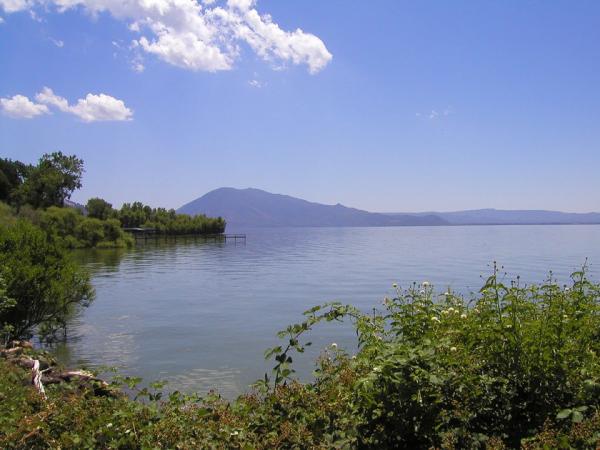Tony Hale
Tony Hale, PhD
Program Director
Environmental Informatics Program
Design and Communications
Geographic Information Systems
Information Technology Systems
510-746-7381
Dr. Tony Hale worked in a range of corporate and educational organizations, as well as both private nonprofit and public institutions, before establishing himself as an environmental science technologist. As Program Director for Environmental Informatics, Dr. Hale represents five technical teams: Geographic Information Systems, Application Development, Data Services, IT Systems, and Design & Communications. He always pursues compelling ways to promote technology initiatives, environmental stewardship, and meaningful, collaborative innovations.
While completing his doctorate at UC Berkeley, Dr. Hale consulted in technology for several years before launching a career at Mills College where he eventually served four years as an IT Director. He then progressed to become head of the enterprise applications team for Peralta Community College District, the second-largest educational organization in the San Francisco Bay Area.
Making the transition to environmental science, Dr. Hale joined the California Ocean Science Trust and led the development of OceanSpaces, an online community to foster new knowledge of ocean health. He also served as member of several state-level committees including the California Coastal & Marine Geospatial Workgroup. He is currently co-chair of the Data Management Workgroup, affiliated with the California Water Quality Monitoring Council.
With SFEI, Dr. Hale has advanced the Institute’s communications practices, overseen the development of new data visualization technologies, and partnered with state and federal agencies to address complex data management challenges.
Related Projects, News, and Events
 Building a framework for an integrated HAB detection and monitoring system (Project)
Building a framework for an integrated HAB detection and monitoring system (Project)
Over the last decade, harmful algal blooms (HABs) have emerged as one of the highest-priority water quality management issues in the San Francisco Estuary, which includes the San Francisco Bay (Bay) and Sacramento-San Joaquin River Delta (Delta). Although major HAB events in the Bay have historically been rare, recent studies have determined that multiple HAB species and their toxins are frequently detected in the Bay, highlighting the potential for major HAB risks.
 Baylands Change Basemap (Project)
Baylands Change Basemap (Project)
The Baylands Change Basemap will update the existing map of tidal marsh, tidal flats and diked baylands to incorporate the many changes in baylands distribution and abundance that have occurred over the last two decades. It will also include new information about land use and infrastructure that affects baylands restoration and management constraints and opportunities. To ensure the map is as up-to-date as possible, the project will develop procedures for ongoing local updates and change detection to cost-effectively maintain the basemap’s high value.
 Statewide Plastics Monitoring Plan & Strategy (Project)
Statewide Plastics Monitoring Plan & Strategy (Project)
Plastics, in their various chemical composition and sizes, pose serious challenges to the vitality of California's ecosystems. Once escaped into the environment, plastic contamination persists for very long periods and breaks down into ever smaller pieces, becoming more readily available to wildlife and populations who live, work, and play in those same habitats.
NOAA recently announced that it is awarding a $3-million grant, through its Monitoring and Event Response Research Program (MERHAB) to support the development of a harmful algal bloom (HAB) monitoring program for the San Francisco Estuary. The project, led by scientists at the San Francisco Estuary Institute (SFEI), US Geological Survey, and California Department of Water Resources (DWR), will leverage on-going research and monitoring activities in the Bay and Delta to build a robust system-wide HAB monitoring program for the Estuary.
 California Trash Monitoring Methods Project (Project)
California Trash Monitoring Methods Project (Project)
The California Ocean Protection Council (OPC), in close partnership with the State Water Board, has recognized the importance of standard methods for trash monitoring and has funded this project. The Southern California Coastal Water Research Project (SCCWRP) and San Francisco Bay Estuary Institute (SFEI) have partnered up to test multiple trash monitoring methods with a goal of developing a library of methods with known levels of precision, accuracy, and cross-comparability of results, and linking these methods to specific management questions.
 Development of Lake County Water Quality Data Exchange Program (Phase 1) (Project)
Development of Lake County Water Quality Data Exchange Program (Phase 1) (Project)
SFEI will leverage its experience as a Regional Data Center for CEDEN to deliver a scientifically sound data management strategy and plan for the Habematolel Pomo of Upper Lake (HPUL) and the Lake County Watershed Protection District (District).
 California Pesticides: A Data Visualization Tool to Link Pesticide Use and Management to Water Quality (Project)
California Pesticides: A Data Visualization Tool to Link Pesticide Use and Management to Water Quality (Project)
Despite California's data-rich environment, there are still many obstacles when trying to access and understand pesticide data at the nexus of water quality, ecological effects, and human health. We recognize a need to fill data gaps, not necessarily by collecting new data, but by better leveraging information already technically in the public domain. The goal of this project is to bring pesticide reporting, occurrence, and toxicity data together in ways that yield insights and meet the expressed needs of stakeholders in clear, efficient, credible, and repeatable ways.
 Shallow Groundwater Response to Sea Level Rise (Project)
Shallow Groundwater Response to Sea Level Rise (Project)
The response of shallow groundwater to sea-level rise is a relatively new field of study. For low-lying coastal communities, sea-level rise adaptation efforts must consider the potential for groundwater rise to avoid maladaptation. The need to better understand this slow and chronic threat was identified as a critical data gap in the San Francisco Bay Area’s adaptation efforts during the Bay Area Groundwater and Sea-Level Rise Workshop in 2019.
 New study advances our understanding of the concerns related to rising groundwater (News)
New study advances our understanding of the concerns related to rising groundwater (News)
Featured in the Los Angeles Times, Mercury News, San Francisco Chronicle, San Francisco Examiner, KneeDeep Times, Marin Independent Journal, KQED, KALW, and ABC News, a new study sheds light on the hazards presented by rising groundwater.
 Healthy Watersheds Resilient Baylands (Project)
Healthy Watersheds Resilient Baylands (Project)
Through the EPA-funded Healthy Watersheds Resilient Baylands project, SFEI and sixteen partner organizations are developing multi-benefit tools to enhance climate change resilience in San Francisco Bay. Healthy Watersheds Resilient Baylands has two major components: Multi-benefit Urban Greening and Tidal Wetlands Restoration. Through both components, we have developed strategies that inform policy, planning, and design of innovative implementation projects.
 Microplastics and Harmful Algal Blooms in California's waters (News)
Microplastics and Harmful Algal Blooms in California's waters (News)
By May 1, 2017, in time for harmful algal bloom season, a new feature will appear on California's Harmful Algal Bloom portal (http://www.mywaterquality.ca.gov/habs/) that displays satellite imagery designed to detect emerging and historical blooms. Using data and algorithms provided by NOAA's National Centers for Coastal Ocean Science, the San Francisco Estuary Institute developed a new tool under the guidance of California's Bio-accumulation Oversight Group.
 SARs-CoV-2 Monitoring in Wastewater (News)
SARs-CoV-2 Monitoring in Wastewater (News)
18 months of innovative data visualization to inform local, regional, and state public health departments.
SFEI’s Software Engineering Manager Gemma Shusterman led the development of a new data dashboard, designed to track the spread of COVID-19 in our region. With funding from the Catena Foundation, SFEI’s Environmental Informatics program supported the groundbreaking scientific genetic sequencing data produced by our close partner, the University of California’s Berkeley Water Center. Together, SFEI and the Berkeley Water Center matched science with technology to produce actionable, timely information in support of smart public health decisions.
 GreenPlan-IT (Project)
GreenPlan-IT (Project)
Green infrastructure (GI), such as permeable pavement, rain gardens, tree-well planters, or bioswales, can be used as cost-effective, resilient approaches to managing stormwater at its source while delivering environmental, social, and economic benefits for your community. GreenPlan-IT is a versatile open-source toolset that helps aid municipalities with their efforts to plan and evaluate the placement of green infrastructure in the landscape and track the effectiveness of these installations in reducing stormwater run-off, PCB, and mercury in receiving waters.
 GreenPlan-IT Toolbox evolving quickly to meet increased demand (News)
GreenPlan-IT Toolbox evolving quickly to meet increased demand (News)
With the conclusion of the first round of funding for the Green Plan Bay Area project http://www.sfestuary.org/our-projects/water-quality-improvement/greenplanning/, SFEI produced GreenPlan-IT in collaboration with SFEP, a technical advisory committee, pilot partners, and BASMAA. GreenPlan-IT is an innovative planning tool to help municipalities evaluate multiple management alternatives for green infrastructure in the urban landscape.
 GreenPlan-IT featured in the newsletter of the National Water Quality Monitoring Council (News)
GreenPlan-IT featured in the newsletter of the National Water Quality Monitoring Council (News)
GreenPlan-IT, a toolset created in a collaboration with SFEP, US EPA, and local partners, has been featured in the newsletter of the National Water Quality Monitoring Council, which has in turn been distributed broadly to subscribers throughout the nation and beyond.
 GreenPlan-IT Site Locator Tool v2.1 Update (News)
GreenPlan-IT Site Locator Tool v2.1 Update (News)
SFEI’s GreenPlan-IT is a planning level toolkit which help municipalities with green infrastructure planning, assessment and reporting. Green infrastructure is a multi benefit tool that helps to restore the natural water cycle of infiltration and filtration (most notably of mercury and PCBs) within the urban environment.
 GreenPlan-IT Phase II nears completion (News)
GreenPlan-IT Phase II nears completion (News)
SFEI has completed development of Phase II of our GreenPlan-IT application -- a toolset to empower municipalities to plan, assess, track, and report their green infrastructure investments. This helps restore the water cycle and improve filtration of water quality contaminants. In the latest round of implementation work, we collaborated with the cities of Richmond, Oakland, Sunnyvale, and the county of Contra Costa to meet their green infrastructure planning and reporting needs, while also providing needed enhancements to the toolset in response to user feedback.
 SFEI's journal article on Green Stormwater Infrastructure featured as the Editor's Choice (News)
SFEI's journal article on Green Stormwater Infrastructure featured as the Editor's Choice (News)
A team led by Dr. Jing Wu penned a paper in January on using Green Stormwater Infrastructure to protect the Bay from PCBs and other contaminants. "Optimal Selection and Placement of Green Infrastructure in Urban Watersheds for PCB Control" is now featured in the Editor’s Choice section of the Journal of Sustainable Water in the Built Environment for the American Society of Civil Engineers.
 EcoAtlas (Project)
EcoAtlas (Project)
EcoAtlas is a set of tools for generating, assembling, storing, visualizing, sharing, and reporting environmental data and information.
 Geospatial Compliance Monitoring System (Project)
Geospatial Compliance Monitoring System (Project)
The Geospatial Compliance Monitoring System (GCMS) is an online database that records all biological opinions and the information associated with them to ensure that requisite actions are tracked, monitored, and enforced.
To this end, the GCMS houses a customized set of information, tailored to the needs of the US Fish and Wildlife Service (USFWS) regarding the projects occurring in Southern California (associated with its Carlsbad office). The system then issues notices based on overdue conservation measures on a daily basis.
- 1 of 4
- next ›

